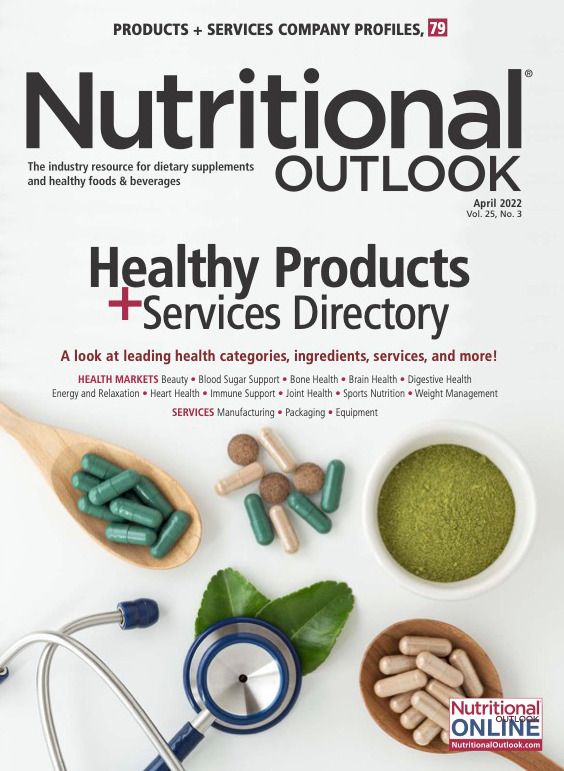How will the weight-management supplements market shape up post-pandemic?
As consumers seek to shed pandemic pounds, they are also holding up their newfound focus on health overall.
As consumers work to shake off their post-quarantine weight gain, the natural products industry is also reshaping its approach to weight management with a holistic/lifestyle tactic instead of flashy claims.
“We know that 61% of people surveyed in the American Psychological Association’s ‘Stress in America’ 2021 report said they gained unwanted pounds during the COVID-19 pandemic—an average of 29 pounds to be exact,” says Rachel Kreider, MPH, RD, director, nutrition content and services, at GNC. “So, the interest in weight management is expected to remain strong and will likely grow.”
As many in the weight-management scene have experienced over the past several years, the category has shifted its overall approach.
“The shift in reasons for weight loss may well change the approach to products and ingredient innovation,” Kreider says. “The ‘pitch’ is undoubtedly evolving to a lifestyle/long-term-change approach versus quick fixes.”
Dustin Elliott, senior brand manager at The Vitamin Shoppe, points out that “Some customers looking to manage their weight no longer believe in the ‘magic pill’ to reach their goals after having so many products fail them in the past.” Innova Market Insights, a global market intelligence agency, has tracked this trend as well, reporting that in the United States, weight-loss new product development has shifted away from traditional “diet” companies.
Elliott continues: “[M]ore customers are realizing that a lifestyle change is necessary versus a crash diet. As a result, the market has responded accordingly with better-for-you items in snacking and meal-replacement powders. The innovations that are coming from a science perspective help support this approach to healthy lifestyles with ingredients being researched for blood sugar and appetite control.”
As consumers seek healthier lifestyles, ready-to-consume, on-the-go products that easily fit into their everyday routines will win the day. “Convenience continues to be important, so ready-to-drink beverages are popular as well as snack items like bars and savory snacks,” Kreider notes. “Additionally, the convenience of meal planning continues to resonate with customers. GNC’s partnership with [meal-delivery service] RealEats is one way that we are trying to provide convenient solutions for customers to create healthy routines that support lifelong wellness.”
Weight Market: Ebbs and Flows
The weight-management market has seen its share of ups and downs during the pandemic.
For instance, although the United States is responsible for 20% of global food and beverage launches in the weight-management space, and 41% of launches in supplements, according to Innova Market Insights, food and drink product introductions in were down, both globally and domestically. Innova reports between 2017-2021, global and U.S. food and beverage launches (excluding pet food and baby/toddler products) with a weight-loss claim declined by 5% and 7%, respectively.
The same isn’t true for supplements, however, which saw products with a weight-loss claim increase 27% globally and 31% in the United States.
What does this mean for consumers’ long-term interest in weight-management products? “Weight management will always continue to be an important concern for consumers from an overall health perspective,” says Ranjana Sundaresan, lead research analyst at Spoonshot, a food and beverage analytics firm. And it’s in line with the new consumer’s focus on holistic health. After all, as Sundaresan points out, “Maintaining a healthy weight is vital in terms of managing diabetes, heart disease, and a host of other ailments.”
Consumers are still talking about weight-management products. Spoonshot’s analysis shows an uptick in references to weight management/weight loss in consumer media channels. As of November 2021, there was a 55% increase since 2016, with some expected seasonal peaks and troughs.
However, business media channels have not kept the same pace, with an overall dip of 14% during the same time frame. “This isn’t too surprising,” Sundaresan says. “The pandemic has had an impact on this space just like most others. Staying safe and healthy became a much greater priority. For both consumers and businesses, immunity became a much larger focus area. Lower activity and higher stress levels also saw people turn to comfort foods at a greater rate.”
Despite that, Sundaresan says Spoonshot’s analysis of online consumer conversations about health shows weight loss is the top concern, accounting for 29.4% of their health conversations, followed closely by detoxification (26.9%) and then a steep dip in gut health (6.6%).
Food + Fitness with a Side of Supplement
Of course, you can’t talk about weight management without talking about fitness. Spoonshot reports that, over the past five years (2017-2021), when consumers talked about health and weight loss together, the top associated aspects were fitness and diet: 62.2% of conversations were about fitness, 50.9% about diet, and 27.2% about nutrition.
“This high association with diet and nutrition for weight management bodes well for food and drink manufacturers, as it always has,” Sundaresan says. “However, the requirements of consumers today are significantly different from those of the past. Weight-loss products, for example, would focus on low fat, which then shifted to low sugar (or high calorie) once research started to back up the benefits of good fats.”
So how are weight-management marketers positioning their products today? Data, for instance, supports a strong connection between weight management and sports nutrition, as consumers still largely lean on energy-boosting food, drinks, and supplements. There’s energy, too. U.S. weight-management food and beverage launches with an “energy/alertness” positioning accounted for 42% of new product launches from 2017-2021, according to Innova Market Insights. Innova also names the top categories with a weight-management claim and their share of all launches tracked (excluding pet food and baby/toddler products): Globally—sports nutrition (35%), supplements (25%), and cereals (8%), versus United States—supplements (38%), sports nutrition (37%), and soft drinks (8%).
A Role for Supplements
During this same time frame, Innova reports supplements as the fastest-growing category in weight management (excluding pet food and baby/toddler products), both globally (+27%) and in the United States (+31%). The top health positionings in weight-management supplement launches are digestive/liver health, globally, and energy and stamina in the United States.
Supplements fit into the holistic approach the industry is shifting to. “There is an ongoing development of trends within the holistic world of weight loss where there is a particular focus on the natural supplements that nature contributes,” says John Alkire, CEO, president and founder of Zanda LLC.
The Leader: Protein
The ingredient that fuses weight management and sports nutrition is consumers’ star satiating ingredient: protein.
“The real winner is protein,” Sundaresan says. Protein saw a significant bump in its share of nutrient-related consumer conversations that included both health and weight loss: up from 30.63 in 2018-2019 to 67.08 in 2020-2021. Interestingly, during this same time frame, fiber dropped in conversations from 12.84 to 6.37. “Especially since gut health is the third most talked-about health concern,” she says. “Brands have attempted to promote fiber through its satiety and digestive-health benefits, but it hasn't really caught on in the way that protein did. Added to this is the fact that fiber can alter a product’s texture significantly, which can make foods less appealing. Interestingly, protein does this, too, but is often given a pass by consumers.”
Globally and in the U.S. market, Innova Market Insights reports the top health position between 2017-2021 for weight-management food and beverage launches (excluding pet food and baby/toddler products) was “high source of protein,” accounting for 49% and 48% of new product launches, respectively. In the United States, “gluten free” followed closely behind protein at 46%, and a “high source of fiber” came in second, at 31%, globally.
Among the top ingredients by dollar amount for weight-loss vitamins and supplements, some form of protein accounted for six out of the top 11 ingredients in the 52 weeks ending December 26, 2021, according to market researcher SPINS. These forms of protein range from animal protein and casein to a combination of whey-and-casein and animal-and-plant proteins.
SPINS says, “Shoppers are all about adding ease into their lives with products that are multifunctional or even work while they sleep. Research has shown that ingesting products with casein before bed can increase energy, suppress appetite, and decrease body fat.”
Spices+
Spices, botanicals, and extracts are among the top ingredient influencers in weight management for supplements as well. According to Innova Market Insights, in the United States, nutraceuticals and botanicals are among the top ingredient categories in supplements with weight-management claims.
More specifically, in the weight-loss vitamins and supplements category, cinnamon, cayenne, and orange peel extract are among the top 10 ingredients with the highest percentage of growth in the 52 weeks ending December 26, 2021, according to SPINS tracking of the U.S. natural and conventional retail channels.
Where Is Weight Management Headed?
There’s more to come in weight management.
“As research continues to unravel the relationship between the microbiome and weight, I think we’ll see some exciting innovations in that space,” Kreider says. As some data showed above, weight management is often coupled with digestive-health claims, and this association is likely to continue as more science emerges connecting the microbiome to overall wellness, which includes weight management.
Self-monitoring tools will also help. “I believe that the increased access to home test kits to gauge health parameters will make it easier for customers to find customized solutions that work for their bodies,” Kreider continues. “Plus, customers have become more accustomed to telehealth and self-service with their healthcare (hello at-home COVID tests!), so there are probably a lot of opportunities to take that interest and ease-of-use to the next level with weight-management customers.”
Healthy indulgences are another way consumers are managing their weight while boosting their pleasure. And this comes in many forms—from portion control and snacking to frozen treats and better-for-you sweets. In fact, the second-fastest-growing category in weight management between 2017-2021 was dairy (+6%; globally) and desserts/ice cream (+21%; in the United States), according to Innova.
Data shows consumers have shifted from guilty to permissible, and from treats to snacks. According to Mintel research, 78% of consumers believe snacking can be a part of a healthy diet, and 69% want snacks that balance health and taste. Paris Hogan, senior consultant at Mintel, says in her blog entry, “The Rise of Permissible Indulgence and Frozen Snacking,” “As the definition of snacking has widened, frozen snacking has entered the consideration set in a big way. Frozen treats are no longer solely confined to the late evening/nighttime after-dinner occasion, and in consumer’s minds, have likely evolved from frozen treats to frozen snacks.” According to Mintel research, in the last six months, 59% of consumers say they purchase frozen desserts as a snack.
Many companies are also turning up the indulgence factor in healthy products such as bars, yogurts, and traditional desserts. And of course, plant-based food and drinks are continuing to influence the weight-management space as product developers find new ways to swap out animal-based ingredients for plant-based ingredients. This, too, has trickled into the healthy indulgence space—for example, with vegan or vegetarian ice creams and custards.
“Plant-based eating continues to trend, so we’ll see growth in the vegan/vegetarian category, showcasing ingredients that complement weight loss as functional foods and dietary supplements,” says Rachel Baker, MS, RD, CSSD, LDN, manager of scientific content and communications at GNC
And as the category continues to innovate and adapt, ingredients like protein, indulgent-yet-healthy-foods, as well as multifunctional supplements will remain top draws—both in product launches and popularity.



























